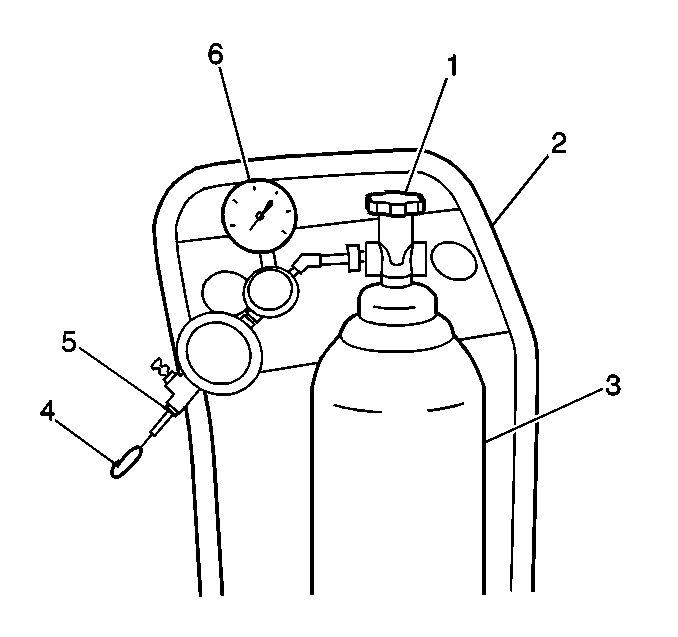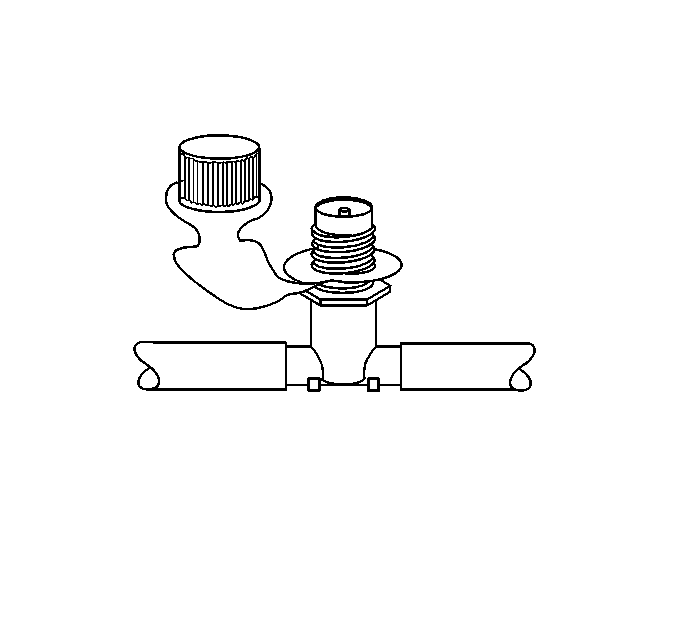For 1990-2009 cars only
Tools Required
J 41413 EVAP Pressure/Purge Diagnostic Station
Notice: Use the EVAP Pressure/Purge Diagnostic Station J 41413 in order to provide a clean, dry, low pressure gas source. Do not substitute any other pressurized gas source. Damage may result to the EVAP system.
Important: Whenever the EVAP DTC diagnostics lead to a no trouble found or an EVAP purge valve replacement, proceed with the following EVAP canister diagnostics.
- Remove the EVAP canister purge valve. Refer to Evaporative Emission Canister Purge Solenoid Valve Replacement .
- Lightly tap the EVAP purge valve on a clean work area.
- Look for carbon particles or carbon dust exiting from either of the vacuum ports.
- Remove the EVAP canister from the vehicle. Refer to Evaporative Emission Canister Replacement .
- Turn off the main cylinder valve (1) on the J 41413 EVAP pressure/purge diagnostic station.
- Disconnect the black hose (4) that connects the nitrogen cylinder to the cart J 41413 at the pressure regulator (5) by unscrewing the knurled nut on the pressure regulator.
- Connect a section of the vacuum hose to the open fitting of the J 41413 pressure regulator (5).
- Connect the other end of the vacuum hose to the engine compartment EVAP purge pipe.
- Turn on the main nitrogen cylinder valve (1).
- Continue to blow any debris from the purge pipe for 15 seconds.
- Return the J 41413 to its original condition by re-installing the black hose (4) disconnected in Step 6.
- Replace the EVAP canister purge valve with the new component. Refer to Evaporative Emission Canister Purge Solenoid Valve Replacement .
- Replace the EVAP canister with the new component. Refer to Evaporative Emission Canister Replacement .
- Connect the J 41413 to the vehicle EVAP service port.
- Turn the 4 position switch to Purge.
- Idle the engine at a normal operating temperature.
- Open the throttle until the engine speed reaches 2000 RPM.
- Observe the H2O vacuum gauge on the EVAP cart. The vacuum should read more than 15 in. H2O.

| • | Reinstall the purge valve If no carbon release is evident. Continue with the published service manual DTC procedures. |
| • | Continue with this service procedure if carbon is released from the purge valve. |

| • | Check the vacuum supply to the EVAP purge valve if the vacuum is less than 15 in. H2O. |
| • | Continue with the published service diagnostics if the vacuum is more than 15 in. H2O. |
